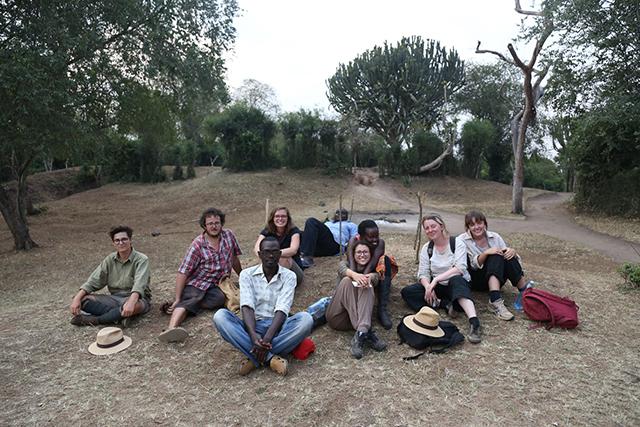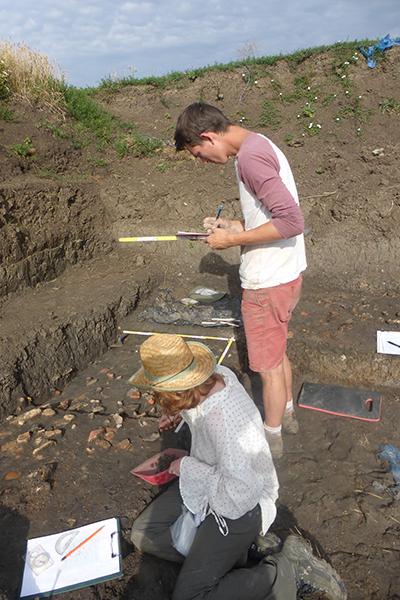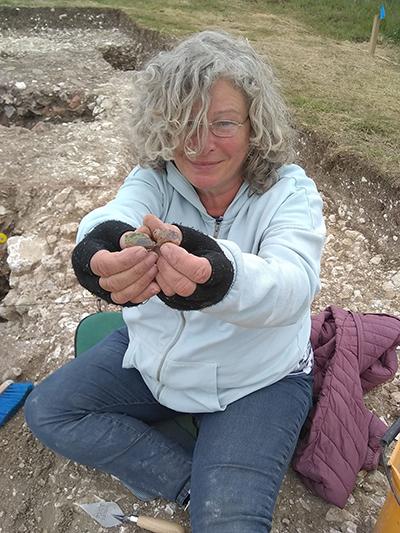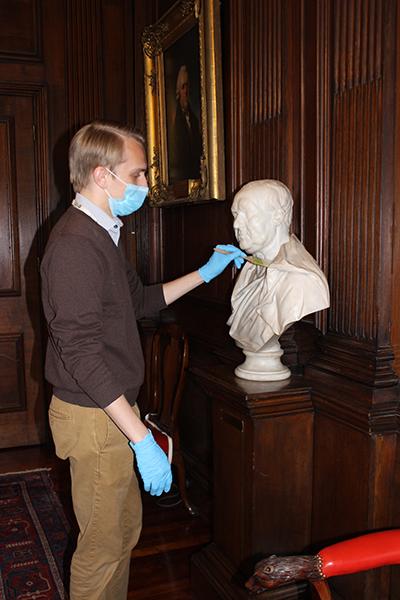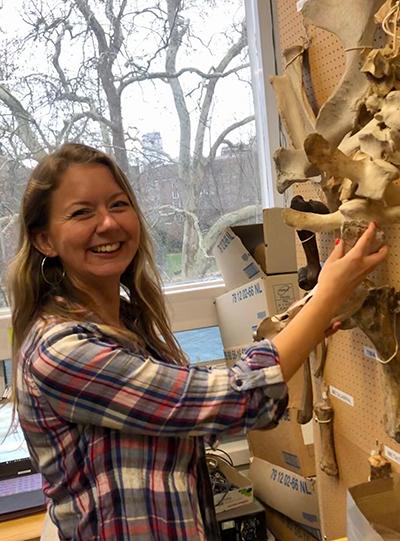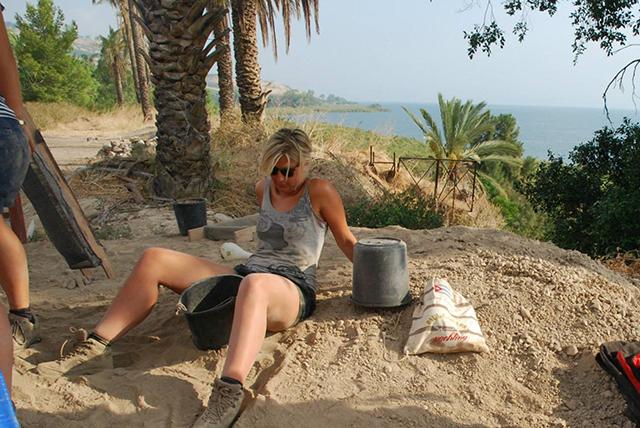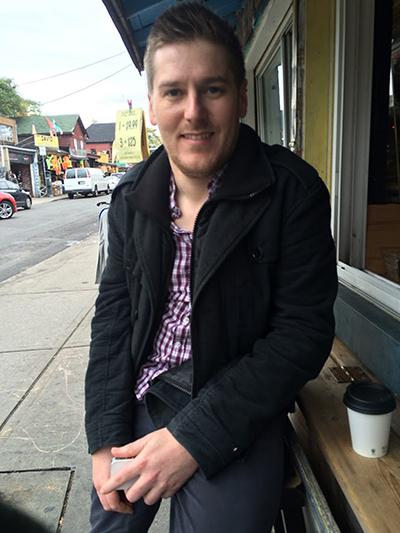Research-led Teaching
Studying at UCL Institute of Archaeology (IoA) is an experience like no other. Consistently rated one of the best archaeology departments in the UK, the IoA offers a unique experience to each of its students, at both the undergraduate and graduate levels. Students at all stages of their academic careers are encouraged to engage with current archaeological research – guided by a 70-strong academic staff who are amongst the leaders in their fields. To all those considering embarking on the adventure of a lifetime, here’s how students at the Institute connect and engage with the very best archaeological research the UK has to offer!
With seven undergraduate degree programmes and twenty masters’ degrees, the IoA provides a huge variety of options for its students, covering a vast range of archaeological topics in both theoretical and practical terms. A degree at the Institute aims to challenge student expectations and develop a wide range of transferable skills, so demands time and commitment. Each degree has a distinct character, and is structured around specified core courses and a dissertation.
Information on both undergraduate and masters’ degree courses can be found at: https://www.ucl.ac.uk/archaeology/study. Fieldwork also plays a vital role in the student experience, with undergraduates undertaking a minimum of 70 days throughout their three years (funding towards the 70 days of fieldwork is available for all undergraduates). We currently have students on excavation in North, South and Central America, Europe, Africa and Asia. Working in the field helps students to gain a better understanding of the quality and range of data that can be collected from excavation and survey, or offers them the experience of working at heritage sites or in museums, and the chance to travel to parts of the world that they have been learning about in their coursework (Figures 1 and 2).
The Institute also has the largest and most diverse community of archaeology research students of any university in the world. Our academic staff offer PhD supervision across a wide topical, geographical and chronological range, and with the support of a personal supervisor students research an individual topic over three years.
Information on PhD and staff research interests can be found at: http://www.ucl.ac.uk/archaeology/people
Life at the Institute
Located in the heart of Central London, UCL’s campus puts students within easy walking distance of museums, theatres, cultural life and even on-going archaeological excavations. The Institute itself sits on the northern side of Gordon Square, and is home to all our staff, undergraduates, masters’ and PhD students. Amongst its many charms, the Institute houses: an exceptional archaeological library, world-renowned collections, laboratories, computing and photographic facilities, and much, much more. All of our students are encouraged to participate in Institute life, with the Society of Archaeology Students (SAS) and the Society of Archaeology Masters Students (SAMS) running a wide range of social and academic events throughout the year.
Details of open days can be found at:
The Student Perspective
Want to know what it is really like to study at the IoA? Here are a few stories from our current students to give you a little peek into the student experience.
Tanith Furner (1st year BA Egyptian Archaeology)
I fell in love with UCL when I visited the Petrie Museum many years ago. When the idea of studying archaeology crept into my head, the only university I considered was the Institute of Archaeology at UCL. It was a daunting prospect; I left school in 1976 with a handful of O levels. However, I have just completed my 1st year BA in Egyptian Archaeology and I could not be happier.
My year started with four days camping at West Dean investigating prehistoric technologies at PrimTech. I learned how to plot a base of a pyramid with a few bits of string and some sticks, how to make cheese, bread and butter, how to cave paint and how to knap flint. I am 59-years-old and have spondylosis — the thought of camping filled me with dread. However, it was one of the most rewarding experiences of my life. Not only did I learn how past people lived, I met amazing new people and I discovered that ‘where there’s a will, there’s a way’.
Next came the lectures, seminars and tutorials. Starting with the evolution of the modern human, the migration out of Africa, domestication of plants and animals through to the emergence of writing, the first urban centres and the first civilisations. So much knowledge, so well taught. Sometimes it felt as if I had been teleported to a Masters in chemistry lecture, and it was really tough. Other times, I felt like a dry sponge soaking it all up.
In May—June 2019, I spent 12 days at Downley on excavation (Figure 3). Again, I was concerned about my physical capabilities. However, I could not have had more support than I did, from the director and deputy director to the supervisors and my fellow students. They did everything they could to enable me to excavate. I learned more in those 12 days on excavation than I have in a lifetime of reading and visiting archaeological sites.
I have a two-week field school in Spain and a week’s post-excavation experience in Devon to look forward to before returning to the Institute for my second year when my studies will focus more on Egypt. I cannot wait!
Zachary Veith (MA Museum Studies)
Coming from the United States with a background in history, I did not know what to expect when starting a degree at the Institute of Archaeology. The IoA seems like a strange place to house the Museum Studies program. Yet, in addition to the fantastic staff and resources, being here has given me hands-on access to the world-class collection of artefacts available nowhere else. Handling Mesopotamian pots and Grecian figures was something I had never done before, and was a unique experience I was able to have during my first few weeks of the programme. My interest has always been working with museum collections, and how they can be used to tell new and engaging stories to a wider public. Through our lectures handling genuine museum artefacts, I now have the confidence and understanding to work with almost any collection (Figure 4).
Alongside the practical knowledge of object handing, there has been plenty of opportunity for independent research into objects and collections. Last term, I delved into the Petrie Museum archives and collection, researching a Middle Kingdom pot-stand with an unknown provenance. Exploring archival paperwork, historical photographs, and exhibition catalogues brought me out of the library and into the realities of curatorial work. This research and practical knowledge from my coursework has culminated in my dissertation examining the colonial legacies and institutional bias of T.E. Lawrence photography collections in museum archives. The openness to research whatever you are truly passionate about and interested in makes all the difference.
As one of the largest programmes in the IoA, there was no lack of a community. Working everyday with other students who share a common interest in museums and collections has been an encouraging experience, and we have all grown closer after numerous fieldtrips to museums in and out of London. However, the 2019 Exhibition project is an experience with everyone I will not soon forget. Over four months, our team worked closely together with curatorial professionals and experts in the field to put together a truly professional museum exhibition, An Element of Colour: Shaping Self and Society. Bringing together the knowledge and skills from the previous months into a project I really cared about has been the highpoint of the past year for me.
So while I still do not know the first thing about archaeology, my time at the Institute of Archaeology has fostered professional skills and personal relationships that I could not have received anywhere else. The programme has prepared me for an exciting future in the museum sector, and I am looking forward to what London has to offer.
Lucy Sladen (current PhD student, MA Archaeology 2015–16)
I first came to the Institute in 2015, following a nearly decade-long hiatus from archaeology. The broad range of options available within the MA Archaeology programme was perfect in helping me identify my research interests and ascertain whether my return to archaeology would be a (hopefully) permanent move. Through the course, I rediscovered my particular enthusiasm for the early medieval period and zooarchaeology (Figure 5). The breadth of expertise available at the Institute meant I was able to receive world-class teaching and supervision in both areas. My experience at Masters level left me in no doubt that I wanted to remain at the Institute to pursue a longer research degree, which is what I am doing now.
The support that the Institute gives in preparing research proposals and funding applications is second to none. I know that without this assistance, it is unlikely that I would have had the opportunity to be able to pursue freely the research that I wanted to. Since starting the PhD programme, the experience I have gained is far more than just my own research. I have been engaged in teaching at undergraduate level, writing my own seminars, running workshops for secondary school students and presenting research at conferences…among many other things! Being at the Institute gives you a rare opportunity to be part of one of the largest communities of archaeologists in the world. There really is something for everyone here, whether your interests lie more in learning a specific scientific skill, gaining teaching and professional experience or developing new ideas through interdisciplinary collaboration.
Careers: A future in Archaeology and other sectors
A degree in archaeology prepares you for work in any sector after graduation, with the most transferable skills of any degree. At the IoA, we have a dedicated Careers Tutor (plus Personal Tutors are on hand to help and advise students) to help you throughout your studies. We work closely with the UCL Careers office offering students support, guidance and opportunities regarding careers in archaeology, heritage, and related fields and across all job sectors. We run annual careers days (open to both undergraduate and postgraduate students) and maintain strong links with London Museums, heritage bodies and our alumni to aid students in securing volunteer positions in their spare time.
Alumni Reflections
Graduates from the IoA go on to do amazing things with their degrees, from the traditional academic route to being policy makers in government and even becoming well-known TV personalities. Here are a few of their stories.
Roseanna Cawthorne (BA in Archaeology and Anthropology 2014)
I have always been fascinated by people. What makes us different and the same? How do our rituals bind us, our cultures define us, and our beliefs divide us? That is why I chose to study Archaeology and Anthropology. For me, it felt like a natural place to start in a quest to answer these questions.
The allure of adventures to foreign lands and uncovering forgotten societies was what drew me to the archaeological excavations. But I realised that although it was fun, it was not the career path for me (Figure 6). For me, the puzzles I wanted to answer lay with the living.
I became obsessed with health. How we define health and sickness, as well as how we treat it, is deeply culturally embedded. I remember being captivated by topics which intersected ethical, political and philosophical debate, such as mental health, disability, and human reproduction. I focused primarily on the latter in my dissertation, and after graduating, I applied for jobs with all the fertility clinics in London. However, I didn’t really know what I was applying for. I had learned so much about the socio-cultural factors of fertility treatment but had no clue how to transfer this niche topic into a job in the health sector!
Blinded by passion for the subject, I took a (truthfully, rather boring) temporary admin role with an IVF clinic. But I fell in love with the sector, and over two and a half years with the clinic I managed to craft myself a new role which allowed me to use my academic knowledge to support patients.
When I moved back to Yorkshire in 2017, I looked for similar jobs and found a big fat void. So I decided to contact the charity Fertility Network UK to find out how I go about setting up a support service locally. It wasn’t easy, and involved applying for funding, creating and delivering a marketing strategy, and engaging local stakeholders. This ‘job’ is still my passion but is completely voluntary.
My day job involves working as a Strategy Analyst for NHS England’s Innovation, Research and Life Sciences Group on the Test Bed programme. Test Beds pilot innovations which aim to improve patient outcomes at the same or lower cost to the NHS. We know that the NHS is very slow to adopt new technologies, so we are now researching and designing what a new testing infrastructure could look like to speed up the adoption and spread of quality health technology across the country.
When I walked through the UCL IoA doors for the first time I had no clue where the future would take me. The most important thing I learned there was that it’s possible to make your obsession your career, if you’re open minded enough about the path you take to get there!
Nicky Garland (PhD Archaeology and Former member of staff – Archaeology South-East)
I first came to UCL in 2008, not as a student, but as a Fieldwork Supervisor at Archaeology South-East (ASE), the commercial branch of the Institute of Archaeology. Based just outside of Brighton, I led a number of fieldwork projects of different periods across south-east England. By 2009, I’d been working for several years in developer-funded archaeology and set my sights on undertaking a PhD. As a staff member, I already knew how fantastic the Institute was as both a centre of research and a place to study, so I applied and was accepted. My project focused on the use of archaeological data from developer-funded archaeological projects to understand better Late Iron Age settlement in south and east Britain. I was fortunate to be able to take advantage of the UCL Study Assistance Scheme, which provides staff financial support if they are pursuing a qualification that support their careers. In practice, this meant that I had reduced fees while I worked full-time at UCL and pursued my PhD part-time. I left ASE in 2012, moving onto other positions in developer-led archaeology including consultancy and post-excavation analysis. Despite living away from London for most of my degree, I continued to visit the Institute often for supervisory meetings, conferences and social events (Figure 7).
Part-time study from a distance was not always the most conducive for progress but thanks to my understanding and helpful supervisors (Sue Hamilton, Andy Gardner, Dominic Perring) I was able to hand my thesis with minimal interruption and on time. I passed my viva late in 2016 with minor corrections and completed early in 2017. Although it was challenging at times to cross the threshold between commercial and academic archaeology, the time I spent at UCL was transformative for me, developing skills in research and teaching as well as allowing me to develop a deep interest in archaeological theory.
Since I finished my PhD, I have put my new skills to good use. At Cotswold Archaeology, I worked as a Seniors Publication Officer, teaching post-excavation analysis and report writing. I also worked as a researcher on the AHRC and English Heritage funded ‘Exeter: A Place in Time’ Project. There, I analysed the fieldwork notes from several excavations undertaken in the centre of Exeter in the 1970s. These notes described key Roman and medieval sites within the city that were never published. My work, along with others in the team, saw these notes turned into full excavation records, due to be published next year.
I was also fortunate to hold a short post-doctoral research post at the University of Leicester on the AHRC-funded ‘Hoarding in Iron Age and Roman Britain’ Project. For the last two years, I’ve been employed as a Research Associate in the School of History, Classics and Archaeology at Newcastle University. I currently put both my research and fieldwork skills to good use working on the ‘Hadrian’s Wall Community Archaeology Project’ (WallCAP). Funded by the National Heritage Lottery Fund, the project aims to build a network of community volunteers to examine the World Heritage Site and protect it for the future. My role is to construct a GIS for the whole of Hadrian’s Wall and provide training to volunteers in both survey and excavation.

